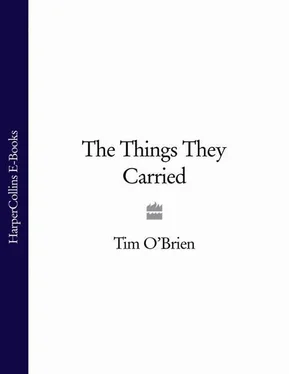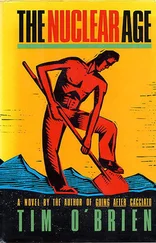Tim O’Brien - The Things They Carried
Здесь есть возможность читать онлайн «Tim O’Brien - The Things They Carried» — ознакомительный отрывок электронной книги совершенно бесплатно, а после прочтения отрывка купить полную версию. В некоторых случаях можно слушать аудио, скачать через торрент в формате fb2 и присутствует краткое содержание. Жанр: unrecognised, на английском языке. Описание произведения, (предисловие) а так же отзывы посетителей доступны на портале библиотеки ЛибКат.
- Название:The Things They Carried
- Автор:
- Жанр:
- Год:неизвестен
- ISBN:нет данных
- Рейтинг книги:4 / 5. Голосов: 1
-
Избранное:Добавить в избранное
- Отзывы:
-
Ваша оценка:
- 80
- 1
- 2
- 3
- 4
- 5
The Things They Carried: краткое содержание, описание и аннотация
Предлагаем к чтению аннотацию, описание, краткое содержание или предисловие (зависит от того, что написал сам автор книги «The Things They Carried»). Если вы не нашли необходимую информацию о книге — напишите в комментариях, мы постараемся отыскать её.
The Things They Carried — читать онлайн ознакомительный отрывок
Ниже представлен текст книги, разбитый по страницам. Система сохранения места последней прочитанной страницы, позволяет с удобством читать онлайн бесплатно книгу «The Things They Carried», без необходимости каждый раз заново искать на чём Вы остановились. Поставьте закладку, и сможете в любой момент перейти на страницу, на которой закончили чтение.
Интервал:
Закладка:
Most of this I’ve told before, or at least hinted at, but what I have never told is the full truth. How I cracked. How at work one morning, standing on the pig line, I felt something break open in my chest. I don’t know what it was. I’ll never know. But it was real, I know that much, it was a physical rupture – a cracking-leaking-popping feeling. I remember dropping my water gun. Quickly, almost without thought, I took off my apron and walked out of the plant and drove home. It was midmorning, I remember, and the house was empty. Down in my chest there was still that leaking sensation, something very warm and precious spilling out, and I was covered with blood and hog-stink, and for a long while I just concentrated on holding myself together. I remember taking a hot shower. I remember packing a suitcase and carrying it out to the kitchen, standing very still for a few minutes, looking carefully at the familiar objects all around me. The old chrome toaster, the telephone, the pink and white Formica on the kitchen counters. The room was full of bright sunshine. Everything sparkled. My house, I thought. My life. I’m not sure how long I stood there, but later I scribbled out a short note to my parents.
What it said, exactly, I don’t recall now. Something vague. Taking off, will call, love Tim.
I drove north.
It’s a blur now, as it was then, and all I remember is a sense of high velocity and the feel of the steering wheel in my hands. I was riding on adrenaline. A giddy feeling, in a way, except there was the dreamy edge of impossibility to it – like running a dead-end maze – no way out – it couldn’t come to a happy conclusion and yet I was doing it anyway because it was all I could think of to do. It was pure flight, fast and mindless. I had no plan. Just hit the border at high speed and crash through and keep on running. Near dusk I passed through Bemidji, then turned northeast toward International Falls. I spent the night in the car behind a closed-down gas station a half mile from the border. In the morning, after gassing up, I headed straight west along the Rainy River, which separates Minnesota from Canada, and which for me separated one life from another. The land was mostly wilderness. Here and there I passed a motel or bait shop, but otherwise the country unfolded in great sweeps of pine and birch and sumac. Though it was still August, the air already had the smell of October, football season, piles of yellow-red leaves, everything crisp and clean. I remember a huge blue sky. Off to my right was the Rainy River, wide as a lake in places, and beyond the Rainy River was Canada.
For a while I just drove, not aiming at anything, then in the late morning I began looking for a place to lie low for a day or two. I was exhausted, and scared sick, and around noon I pulled into an old fishing resort called the Tip Top Lodge. Actually it was not a lodge at all, just eight or nine tiny yellow cabins clustered on a peninsula that jutted northward into the Rainy River. The place was in sorry shape. There was a dangerous wooden dock, an old minnow tank, a flimsy tar paper boathouse along the shore. The main building, which stood in a cluster of pines on high ground, seemed to lean heavily to one side, like a cripple, the roof sagging toward Canada. Briefly, I thought about turning around, just giving up, but then I got out of the car and walked up to the front porch.
The man who opened the door that day is the hero of my life. How do I say this without sounding sappy? Blurt it out – the man saved me. He offered exactly what I needed, without questions, without any words at all. He took me in. He was there at the critical time – a silent, watchful presence. Six days later, when it ended, I was unable to find a proper way to thank him, and I never have, and so, if nothing else, this story represents a small gesture of gratitude twenty years overdue.
Even after two decades I can close my eyes and return to that porch at the Tip Top Lodge. I can see the old guy staring at me. Elroy Berdahl: eighty-one years old, skinny and shrunken and mostly bald. He wore a flannel shirt and brown work pants. In one hand, I remember, he carried a green apple, a small paring knife in the other. His eyes had the bluish-gray color of a razor blade, the same polished shine, and as he peered up at me I felt a strange sharpness, almost painful, a cutting sensation, as if his gaze were somehow slicing me open. In part, no doubt, it was my own sense of guilt, but even so I’m absolutely certain that the old man took one look and went right to the heart of things – a kid in trouble. When I asked for a room, Elroy made a little clicking sound with his tongue. He nodded, led me out to one of the cabins, and dropped a key in my hand. I remember smiling at him. I also remember wishing I hadn’t. The old man shook his head as if to tell me it wasn’t worth the bother.
‘Dinner at five-thirty,’ he said. ‘You eat fish?’
‘Anything,’ I said.
Elroy grunted and said, ‘I’ll bet.’
We spent six days together at the Tip Top Lodge. Just the two of us. Tourist season was over, and there were no boats on the river, and the wilderness seemed to withdraw into a great permanent stillness. Over those six days Elroy Berdahl and I took most of our meals together. In the mornings we sometimes went out on long hikes into the woods, and at night we played Scrabble or listened to records or sat reading in front of his big stone fireplace. At times I felt the awkwardness of an intruder, but Elroy accepted me into his quiet routine without fuss or ceremony. He took my presence for granted, the same way he might’ve sheltered a stray cat – no wasted sighs or pity – and there was never any talk about it. Just the opposite. What I remember more than anything is the man’s willful, almost ferocious silence. In all that time together, all those hours, he never asked the obvious questions: Why was I there? Why alone? Why so preoccupied? If Elroy was curious about any of this, he was careful never to put it into words.
My hunch, though, is that he already knew. At least the basics. After all, it was 1968, and guys were burning draft cards, and Canada was just a boat ride away. Elroy Berdahl was no hick. His bedroom, I remember, was cluttered with books and newspapers. He killed me at the Scrabble board, barely concentrating, and on those occasions when speech was necessary he had a way of compressing large thoughts into small, cryptic packets of language. One evening, just at sunset, he pointed up at an owl circling over the violet-lighted forest to the west.
‘Hey, O’Brien,’ he said. ‘There’s Jesus.’
The man was sharp – he didn’t miss much. Those razor eyes. Now and then he’d catch me staring out at the river, at the far shore, and I could almost hear the tumblers clicking in his head. Maybe I’m wrong, but I doubt it.
One thing for certain, he knew I was in desperate trouble. And he knew I couldn’t talk about it. The wrong word – or even the right word – and I would’ve disappeared. I was wired and jittery. My skin felt too tight. After supper one evening I vomited and went back to my cabin and lay down for a few moments and then vomited again; another time, in the middle of the afternoon, I began sweating and couldn’t shut it off. I went through whole days feeling dizzy with sorrow. I couldn’t sleep; I couldn’t lie still. At night I’d toss around in bed, half awake, half dreaming, imagining how I’d sneak down to the beach and quietly push one of the old man’s boats out into the river and start paddling my way toward Canada. There were times when I thought I’d gone off the psychic edge. I couldn’t tell up from down, I was just falling, and late in the night I’d lie there watching weird pictures spin through my head. Getting chased by the Border Patrol – helicopters and searchlights and barking dogs – I’d be crashing through the woods, I’d be down on my hands and knees – people shouting out my name – the law closing in on all sides – my hometown draft board and the FBI and the Royal Canadian Mounted Police. It all seemed crazy and impossible. Twenty-one years old, an ordinary kid with all the ordinary dreams and ambitions, and all I wanted was to live the life I was born to – a mainstream life – I loved baseball and hamburgers and cherry Cokes – and now I was off on the margins of exile, leaving my country forever, and it seemed so impossible and terrible and sad.
Читать дальшеИнтервал:
Закладка:
Похожие книги на «The Things They Carried»
Представляем Вашему вниманию похожие книги на «The Things They Carried» списком для выбора. Мы отобрали схожую по названию и смыслу литературу в надежде предоставить читателям больше вариантов отыскать новые, интересные, ещё непрочитанные произведения.
Обсуждение, отзывы о книге «The Things They Carried» и просто собственные мнения читателей. Оставьте ваши комментарии, напишите, что Вы думаете о произведении, его смысле или главных героях. Укажите что конкретно понравилось, а что нет, и почему Вы так считаете.












